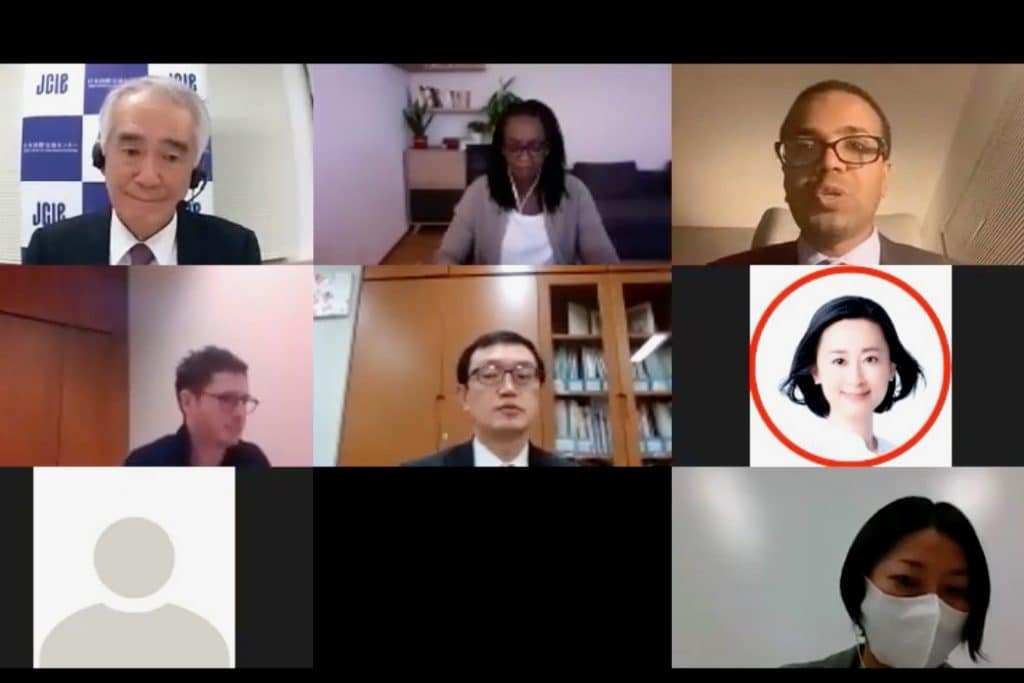The Japan Center for International Exchange (JCIE) organized a special roundtable in conjunction with International Universal Health Coverage Day (on December 12) to highlight the work of the Global Financing Facility (GFF) in advancing universal health coverage (UHC) and how developments such as the COVID-19 pandemic are affecting the push for UHC and the GFF’s work. The virtual roundtable featured two guest speakers, Dr. Amir Aman, former Minister of Health of Ethiopia, and Ms. Maty Dia, the civil society representative of the GFF Investors Group and Board member for Gavi, the Vaccine Initiative. These prominent leaders in the health field presented to 10 legislators from the Japanese Diet, addressing the challenges that African countries still face in implementing UHC, especially for mothers, children, and adolescents, and the role of the GFF plays in their regions.
Ms. Dia then provided her perspective from civil society on the GFF’s role in Senegal and how the GFF has not only impacted maternal and child health services, but is also making efforts to mobilize domestic funds so that countries can cover medical expenses with domestic funds in the long-term. The unfortunate reality is that many African countries have insufficient funds and are unable to properly invest in healthcare. With COVID-19 threatening the progress that has been made by the GFF, Ms. Dia presented the concrete effects of the pandemic on the ground, which have now resulted in a secondary health crisis. The lack of transportation and mobility caused by the lockdowns makes it difficult to get to maternity hospitals, and people tend to refrain from visiting clinics out of fear that they might contract COVID-19. In response to this situation, the GFF is helping to ensure that essential health services related to maternal and child health and nutrition are not delayed by providing telemedicine and support for the delivery of necessary supplies. Ms. Dia concluded with recommendations for what both the GFF and donor countries can do to continue combating these issues in the procurement and distribution of essential health services.
In response to Dr. Aman and Ms. Dia’s presentations, Diet members expressed their appreciation of the GFF’s hard work in Africa, as well as their concerns of this progress being reversed by COVID-19. In building UHC, they noted the importance of considering the daily lives of the people and nutrition as well as health care. While infant mortality rates have been decreasing, thanks to the cooperation of the GFF, the Diet members mentioned the necessity to build on an international cooperative system for the COVID-19 response, and that Japan should make an appropriate contribution.
SPEAKERS
AMIR AMAN HAGOS, former Minister of Health, Ethiopia
MATY DIA WANDELER, CSO representative, GFF Investors Group; Partnership Manager for the Global Financing Facility Civil Society Hub, PAI
PARTICIPATING DIET MEMBERS
ICHIRO AISAWA, Member, House of Representatives (Liberal Democratic Party-LDP)
KAREN MAKISHIMA, Member, House of Representatives (LDP)
ASAHIKO MIHARA, Member, House of Representatives (LDP)
SHU SAKURAI, Member, House of Representatives (Constitutional Democratic Party of Japan)
HIROAKI TABATA, Member, House of Representatives (LDP)
MAIKO TAJIMA, Member, House of Councillors (Constitutional Democratic Party of Japan)
MASAAKI TANIAI, Member, House of Councillors (Komeito Party)
Representative from the Office of Hanako Jimi (LDP)
Representative from the Office of Toshihiko Yoshida (Constitutional Democratic Party of Japan)
OTHER PARTICIPANTS
BRUNO RIVALAN, Advocacy Lead, Global Financing Facility (GFF)
AKIO OKAWARA, President & CEO, Japan Center for International Exchange (JCIE)
TOMOKO SUZUKI, Chief Program Officer, Japan Center for International Exchange (JCIE)
TAORI GOTO, Program Associate, Japan Center for International Exchange (JCIE)

